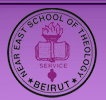NEST Newsletter Dec. 2018: “To Be or… More than To Be”
 From the President
From the President
By Dr. George Sabra, President, Near East School of Theology
“To Be or …More than To Be”
(an abbreviated version of the President’s Convocation Service address on Oct. 1, 2018
This academic year 2018/19 marks the 150th anniversary of the first founding of our Seminary in Lebanon. In 1869, the same American Protestant mission that founded the Syrian Protestant College (AUB) in 1866, founded the Theological Seminary in the village of Abeih, Mount Lebanon. That Theological Seminary of 1869 has been in existence ever since, though it had to suspend its work in some years, changed locations many times, and altered its name twice. N.E.S.T. is today the institution of theological education that has lived through and survived all the upheavals, crises, wars and developments of the past 150 years.
It has witnessed the turbulent last quarter of the 19th century in Ottoman Lebanon, including the huge waves of emigration from Mount Lebanon which swept over the country in the 1890s when tens of thousands, mainly Christians, emigrated to Egypt, Australia, North and South America; it survived World War I with its devastating famine and its horrors, and served as a Red Cross hospital; it experienced the consequences of the Armenian genocide in 1915; it witnessed the end of the 400-year Ottoman domination of these lands and the declaration of Greater Lebanon in 1920, as well as the independence of Lebanon from French Mandate in 1943; it lived through and was affected by the Palestine catastrophe of 1948; it experienced the first internal civil war of the young Lebanese state in 1958 and all the subsequent Arab-Israeli conflicts and wars: 1957 (attack on the Suez canal), the six-day war of 1967, the war of 1973; it suffered through and survived the devastating Lebanese War of 1975-90, including the Israeli invasion of 1982, when it again served as a field hospital but now for the Palestinian Red Crescent; it continued to function under the Syrian domination of the country from 1990-2005; it has been affected by the continued emigration of Christians and drastic decline in numbers here in Lebanon and in the other Near Eastern countries it serves. Throughout all this, it has continued to serve and supply the Protestant churches with ministers, teachers and church workers. We are proud of this record of perseverance. Christians in this region of the world can take pride in, and draw comfort, and perhaps reassurance that they have a future no matter what comes upon them, for they have been able to survive all what I have mentioned and much more over the centuries.
But we need to remind ourselves that there is no guarantee that we will survive and continue – neither as N.E.S.T. nor as Middle Eastern Christians as such. We sometimes have a tendency to glory in the past and to draw confidence from it, but this could be dangerous and deceptive.
The story of Jesus and the fig tree (Mk. 11:12-14) should be a warning to us. The tree had managed to
remain and survive for possibly hundreds of years; it was alive and looked well – for its leaves were green. But it bore no fruit and so was condemned. But, as one commentator put it: “it is not just fruitlessness that is condemned, but fruitlessness in the midst of display that promises fruit.”It had leaves, it looked green and promising, but this was just an outward display.
Do we have anything to show besides the fact that like the fig tree we are still here, that we survived, that we also look alive and well and have many displays of our survival? Are we bearing fruit? It is not enough that we bore fruit in the past; that is no guarantee of continued survival. We, N.E.S.T. and the churches of the Middle East, must continue to bear fruit or judgment will befall us too.
Mere survival was not the vision of our Seminary when it was first founded: Not survival but service to the church, and not even just preparing ministers and evangelizers and laborers for the field of mission, but also bearing witness to the truth: not just “To Be” but “More than To Be”. What is at stake for us in the Middle East today is not simply how to prepare ministers for the churches and how to keep the churches going; this is an important task and it continues to occupy us; but what is also at stake is: which God are we to bear witness to in our lives, thoughts and actions?
In a region of the world where “God” is a warrant and a pretext for war, killing, vengeance, cruelty and usurpation of land, ours is to bear witness in our ministry of theological education, as well as in our lives and actions, to the God who is the father of human beings, a loving God, a crucified God who gives life, and does not rob us of it; who defeats death and does not glorify it; who is for others, not against them. Christians, churches and N.E.S.T. need to remain here to witness to a God who became human for human beings, who became weak for the weak, and who was rejected and marginalized for the sake of the rejected and
marginalized.
That is our mission for – God willing – another 150 years, at least!
